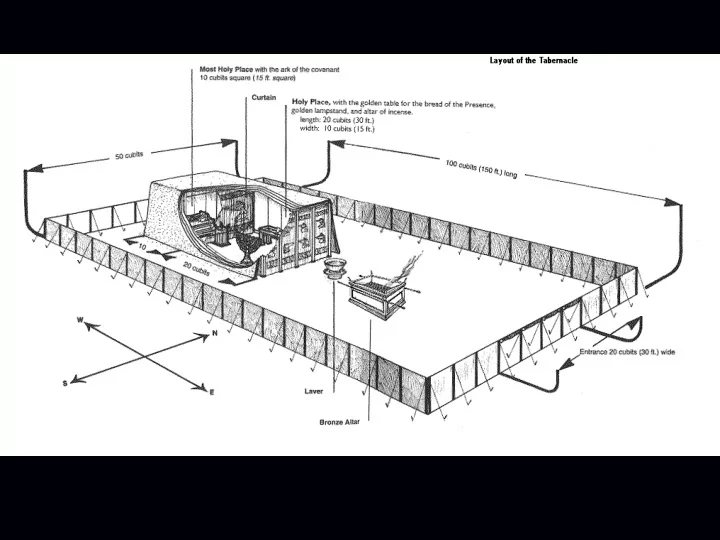

Tabernacle from above
Tabernacle with altar and bronze laver
Tabernacle court with altar and bronze laver
Tabernacle bronze laver
Tabernacle sacrificial altar with ramp
Tabernacle sacrificial altar with Solomon's Pillars
Tabernacle sacrificial altar grate
Tabernacle structure with golden poles
Tabernacle tent fabric
Tabernacle outer court
Tabernacle holy place with objects
Table of showbread
The Lampstand: Christ the Light of the World
Table of Showbread: Christ the Bread of Table of Showbread: Christ the Bread of Life Life
Showbread or shewbread ( arch .) Heb. le � em happ � n îm, lit. ‘bread of the face’, i.e., bread set before the face or presence of God (Ex. 25:30; 35:13; 39:36, etc.) or le � e m hamma‘ a re � e � , lit. ‘bread of ordering’ (1 Ch. 9:32, etc.). The term “continual bread” refers to its perpetual offering (Num 4:7). The idea of “showbread” (KJV shewbread) refers to the arrangement of the bread in rows on the table (1 Chr 9:32; 23:29; 28:16; 2 Chr 2:4; 13:11; 29:18).
Lev 24:5, “And you shall take fine flour and bake twelve cakes with it. Two-tenths of an ephah shall be in each cake. Lev 24:6, “You shall set them in two rows, six in a row, on the pure gold table before the LORD. Lev 24:7, “And you shall put pure frankincense on each row, that it may be on the bread for a memorial, an offering made by fire to the LORD.
Lev 24:8, “Every Sabbath he shall set it in order before the LORD continually, being taken from the children of Israel by an everlasting covenant. Lev 24:9, “And it shall be for Aaron and his sons, and they shall eat it in a holy place; for it is most holy to him from the offerings of the LORD made by fire, by a perpetual statute.”
Exo 25:23, “You shall also make a table of acacia wood; two cubits shall be its length, a cubit its width, and a cubit and a half its height. Exo 25:24, “And you shall overlay it with pure gold, and make a molding of gold all around.
Exo 25:25, “You shall make for it a frame of a handbreadth all around, and you shall make a gold molding for the frame all around. Exo 25:26, “And you shall make for it four rings of gold, and put the rings on the four corners that are at its four legs.
Exo 25:27, “The rings shall be close to the frame, as holders for the poles to bear the table. Exo 25:28, “And you shall make the poles of acacia wood, and overlay them with gold, that the table may be carried with them.
Exo 25:29, “You shall make its dishes, its pans, its pitchers, and its bowls for pouring. You shall make them of pure gold. Exo 25:30, “And you shall set the showbread on the table before Me always.”
Hypostatic Union The hypostatic union describes the person of the incarnate Christ as the union of two natures, divine and human, in the one person of Jesus Christ. These two natures are inseparably united without loss or mixture of separate identity, without loss or transfer of properties or attributes, the union being both personal and eternal. Jesus is undiminished deity and true humanity in one person forever (John 1:14; Heb. 1:2–3; 1 John 4:2).
1 Sam. 21:1, “Then David came to Nob to Ahimelech the priest; and Ahimelech came trembling to meet David and said to him, ‘Why are you alone and no one with you?’ 1 Sam. 21:2, “David said to Ahimelech the priest, ‘The king has commissioned me with a matter and has said to me, “Let no one know anything about the matter on which I am sending you and with which I have commissioned you; and I have directed the young men to a certain place.”’
1 Sam. 21:3, “‘Now therefore, what do you have on hand? Give me five loaves of bread, or whatever can be found.’ 1 Sam. 21:4, “The priest answered David and said, ‘There is no ordinary bread on hand, but there is consecrated bread; if only the young men have kept themselves from women.’
1 Sam. 21:5, “David answered the priest and said to him, ‘Surely women have been kept from us as previously when I set out and the vessels of the young men were holy, though it was an ordinary journey; how much more then today will their vessels be holy?’ 1 Sam. 21:6, “So the priest gave him consecrated bread; for there was no bread there but the bread of the Presence which was removed from before the LORD, in order to put hot bread in its place when it was taken away.”
Matt. 12:3, “But He said to them, ‘Have you not read what David did when he became hungry, he and his companions, Matt. 12:4, “‘how he entered the house of God, and they ate the consecrated bread, which was not lawful for him to eat nor for those with him, but for the priests alone?’”
Recommend
More recommend